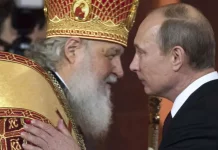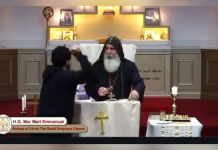The Archbishop writes in Saturday’s Telegraph; his article follows in full:
When England played Scotland in the Euros a few weeks ago, we faced a conundrum. What to sing before the match?
Both nations, England and Scotland, belong to one nation, the United Kingdom of Great Britain and Northern Ireland. We should, surely, have sung one national anthem. But the Scots, with impressive zest, sang Flower of Scotland. And the English sang God Save the Queen. The National Anthem of both nations became just the English anthem.
The question is something more than just coming up with an anthem, it is something about Englishness.
When I grew up in the 1960s, I thought of myself as British. I knew I was English, but it was less significant for my identity. I was aware of our difficult history but rather proud of the pragmatism and vision that had created an experiment in nationhood: different nations living as one. I was British and English. My country was the United Kingdom of England, Scotland, Wales and Northern Ireland: complicated, but it seemed to work.
Various devolutions seemed to be a good development. They emphasized that unity in diversity. They shared responsibility and empowered local government. A Scottish Parliament and a Welsh Assembly were born. But similar developments never really happened in England. Consequently, Westminster started to feel like the English government. And London, with its own Mayor, and with a wealth, size and influence, started to feel like a separate nation: even in England, it was London and the rest.
Brexit delivered further complications and I suspect most people voted on identity not economics.
Many English people feel left behind by metropolitan elites in London and the South East, and by devolved governments and strengthened regional identities in Scotland and Wales. Their heart felt cry to be heard is often disregarded, wilfully misunderstood or patronised as backwardly xenophobic. But what if this is about the loss of identity? No longer British, temperamentally never really European, and definitely outside the wealth and opportunities of London, English people want to know what has happened to their country. These questions of identity and purpose have never really been addressed.
What we need is an expansive vision of what it means to be English as part of the UK. This will help us rediscover a national unity more fractured than I have ever known it in my lifetime.
A first foundation would be a more developed and strengthened regional government within England. Westminster would hold onto those big issues to do with our shared sovereignty, while empowering the separate nations and regions to serve their own localities better.
I say this as a bishop of the Church of England, an inheritor of a post that dates back to AD 627. For a long time the church inhabited a world that was a tapestry of kingdoms and not yet nation states. That memory of regional identity is still very strong here in the north, and only just below the surface elsewhere.
Without strengthening regional identity, we will carry on defining ourselves against things – Europe, London, Westminster – leading to a negative political discourse and a hope-less future. When our English and regional identities are strengthened, we take a proper pride and responsibility in our own self-determination, as part of something larger than ourselves.
Let’s play to our strengths: our shared history within these islands; our strong regional identities going back centuries. Let’s also look to the other things that bind us together as English and British, modernising and strengthening them rather than neglecting them or imagining they are the problem. What are they? Historically they are the very particular but surprisingly enduring threads of our history, such as monarchy and church; and from the more recent past the NHS and even the BBC World Service.
What binds these things together, although so different, is a belief in public service and a desire to serve the common good.
They arise out of that Christian vision itself which is the bedrock of our cultural, ethical and political life. As Jesus taught, it really is about loving your neighbour as yourself. The Church of England is one of the only institutions left in our nation with a local branch in virtually every community, and despite unhelpful reports to the contrary, remains committed to this local and national vision: a church for England. As we’ve seen during the pandemic, and as it has been for centuries, the parish is the beating heart of community life in England. Long may it remain so. Not just church bells and Evensong, but foodbanks, debt relief, youth work, shelters for the homeless and all the other ways the local church works with others to make a difference.
Without a big vision of one United Kingdom and the tight focus of regional identity and governance we will shrink into an amalgamation of communities always in danger of falling apart and only serving the individual good. Together, paying close attention to the inter-relationship of local and national need, our vision is enlarged, we see how our well-being is tied up with our neighbours. Seeking the common good in a nation that is a community of communities would become the driving and unifying purpose of our common life. Since the greatest challenge facing our world is climate change, such a bigger vision of human community and mutual responsibility might be our only way forward.
And why shouldn’t courageous and compassionate English people lead the way?
In fact, these two words seem to me to be the best ones to define the Englishness I long for; the courageous, entrepreneurial spirit of a trading, island nation; and the compassion of a nation slowly facing up to some of the failings of its colonial past; a pioneer of common suffrage and healthcare for all; the birthplace of the World Service. It is time to be proud to be English.
We have exported many things. Let me finish with one of them: cricket. When we say something’s ‘not cricket’, we mean it’s not right. That sense of fair play is something to recover as we learn again to talk to each other across our nation and stop viewing each other so suspiciously. I’m also a big fan of any game that stops for tea. In fact, after the horrors of Covid our whole nation would benefit from a tea break: a chance to pause, re-set and rediscover who we are: a courageous and compassionate community of communities, serving the common good, and delighting in our diversity across these islands.
Then when the different nations of the United Kingdom find themselves pitched against each other on the sports field we could belt out our individual anthems. Then sing our National Anthem together. And love our neighbour.










